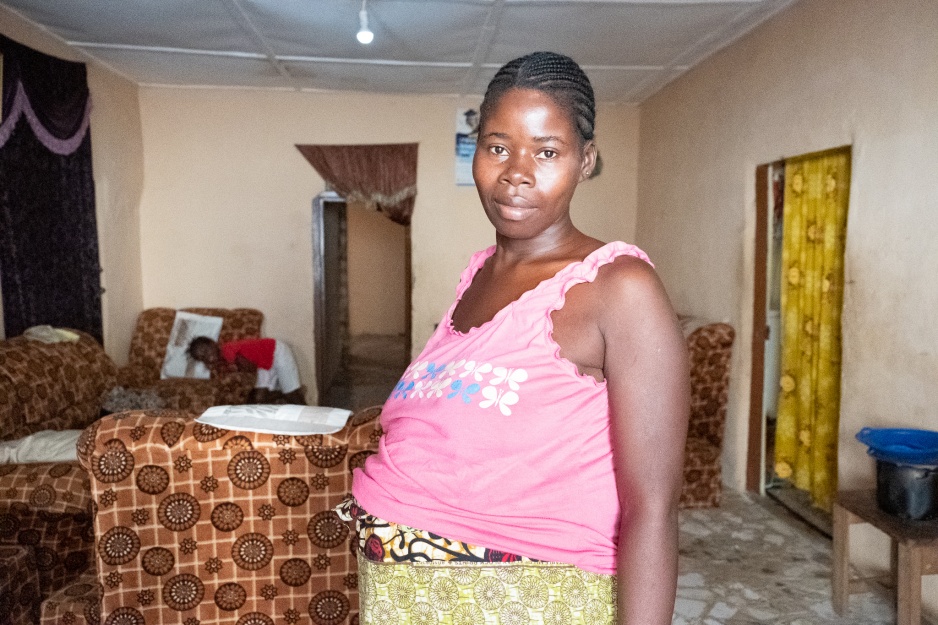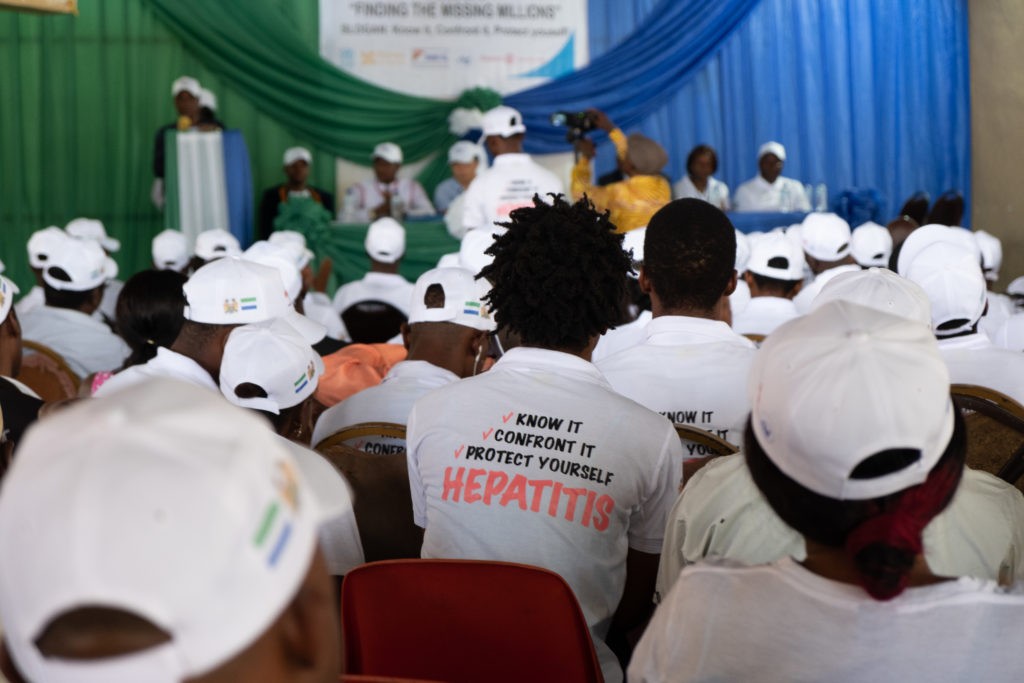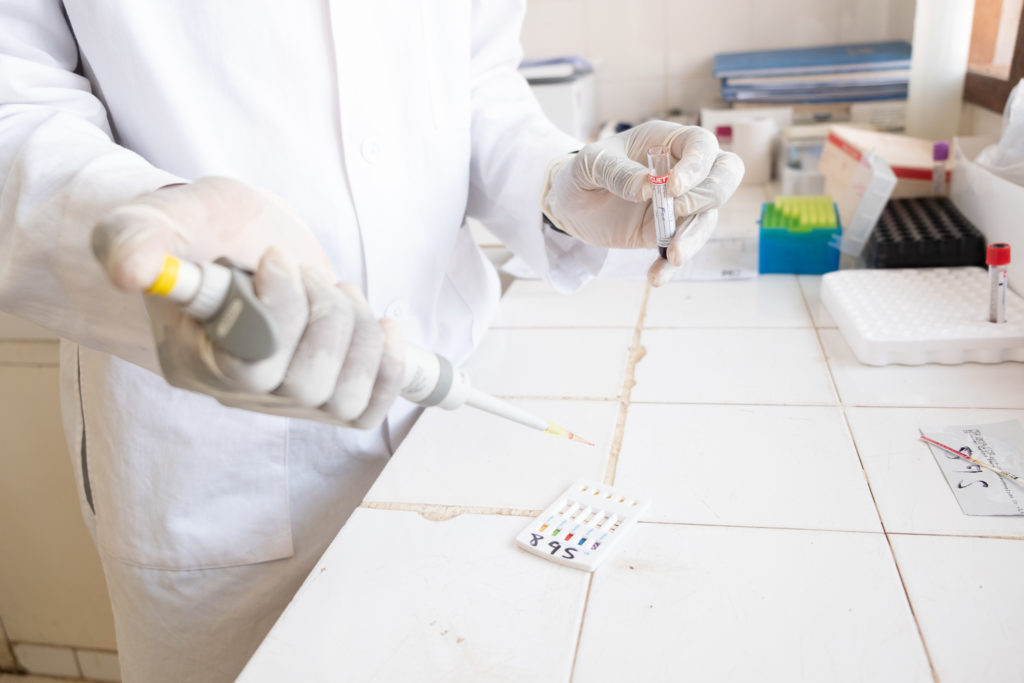New Hepatitis B Clinic Launches in Sierra Leone


Mariama Alieu was heavily pregnant when she was admitted in June to Koidu Government Hospital in eastern Sierra Leone. The 30-year-old mother of four said she’d suffered ill health for more than a year without receiving the correct diagnosis and felt like she would “always have the flu”.
“My chest hurt and there was so much pain in my bones,” Alieu remembered feeling. “A bitter fluid would always come up my throat.”
At the hospital, doctors examined her, ordered the proper tests, and received news from the laboratory that Alieu tested positive for hepatitis B—a disease she’d never heard of up until her diagnosis. She was immediately started on antiviral therapy, which she will take for the rest of her life.
A new hepatitis B clinic
Alieu is one of the first patients to be treated at PIH’s newly opened hepatitis B clinic at Koidu Government Hospital in Kono District, in partnership with Sierra Leone’s Ministry of Health and Sanitation. Staff will strive to care for as many people with the condition as possible through screening, monitoring, and treatment, with the goal of enrolling 75 people into care within the first year. All these services are free of charge.
PIH and government partners hope that what’s accomplished in the new hepatitis B clinic will inform a forthcoming national treatment guideline that will be applied in clinics and hospitals across Sierra Leone. They also will vaccinate 200 medical students in Freetown and vaccinate or treat all clinical and non-clinical staff at Koidu Government Hospital in coming months. The partners’ plans were announced during a joint press conference and seminar hosted in Freetown on Friday, July 26.

Of the five types of viral hepatitis (A, B, C, D, and E), hepatitis B is one of the most prevalent forms worldwide. It is an infection of the liver that is transmitted through the blood or body fluids of an infected person and, if left untreated, can cause irreparable damage to the liver, altering its function completely. Around 350 million people have the infection, 10 times more than those living with HIV.
The World Health Organization estimates that nearly 10 percent of the population in Sierra Leone is infected with hepatitis B, a sharp contrast to the less than 1 percent of the population in the Caribbean and North and South America. Yet despite its high prevalence, clinical testing, immunization, and treatment across Sierra Leone is limited.
Screen, treat, monitor, repeat
That is no longer true at Koidu Government Hospital. Patients admitted with HIV or tuberculosis, as well as maternal health, blood bank patients, and the newborns of mothers with hepatitis B, will now be automatically referred to the hepatitis B clinic for screening via a blood test.
“By increasing screening, we will catch patients earlier,” said Dr. Marta Patino, an infectious disease specialist working at KGH. “We need to make sure the entire structure is in place—screening capabilities, a database, clinicians ready to treat the patients, everything.”

People who test positive for the virus will be continually monitored through regular appointments at the hepatitis B clinic. And those meeting the criteria for therapy, like Mariama, will be started on antiviral treatment, which is a lifetime daily tablet.
“It’s crucial to stop growth of the infection and worsening of the disease, both for the individual’s health and to prevent the spread of infection to others,” Patino said. “The liver needs to be preserved to live a long, healthy life. Some of our younger patients have been refused opportunities, like joining the military, because of this illness.”
Preventing transmission of hepatitis B
Koidu Government Hospital clinical staff face a huge risk when exposed to the blood of hepatitis B patients, which is why PIH will introduce a vaccination and treatment plan for all clinical and non-clinical staff, or around 1,000 people. Those found positive for hepatitis B, who also meet the criteria for treatment, will be provided therapy and monitored regularly through the hepatitis B clinic. Staff who are negative will receive a three-dose hepatitis B vaccine, which is a standard occupational health measure in most health facilities around the world, but not something commonly provided in health facilities across Sierra Leone.
Children under 6 are one of the most likely groups to develop a chronic form of the infection, and so transmission of hepatitis B from infected mothers to newborns is another focus for the hospital’s clinicians. Looking ahead, they hope to vaccinate newborns of mothers living with hepatitis B within 24 hours of their birth, as this has been shown in many countries to reduce the rate of chronic infection to less than 1 percent among immunized children.
Back in June, Alieu’s top concern was how her diagnosis would affect her newborn. “I worry about my pikin,” she said, referring to her baby in Krio. “But I believe in God that the doctors will help me.”
Article originally posted on pih.org



